by Ms. Sheena Agarwal, Purogami Mahila Sangathan (PMS)
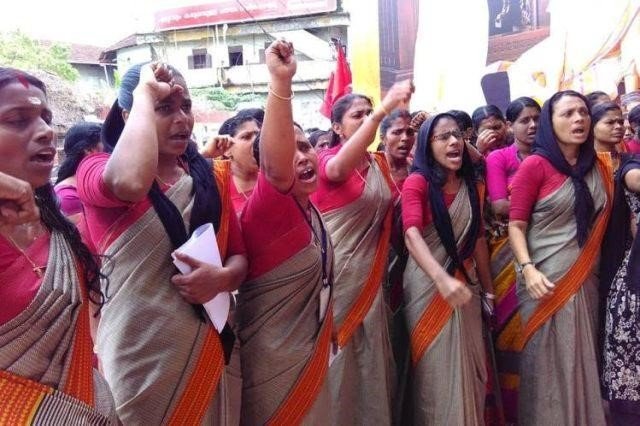
Workers of our country are busy preparing for the two-day All India strike on 28th and 29th March 2022. This strike is against the ani-worker and anti-people policies of the central government and for fulfilment of their Charter of Demands. They have been waging one struggle after another against the pro-capitalist privatisation drive of the government. Peasants of the country fought against the anti-farmer, anti-people farm bills for over a year and have decided to continue their struggler for the unfulfilled promises of the government. They have also decided to join the All India strike, realizing that the fight of both workers and peasants is against big monopoly capitalists who are dictating the policies to the government. The fight of both workers and peasants is ultimately for building an exploitation-free society where people will be in the center-stage and not capitalists.
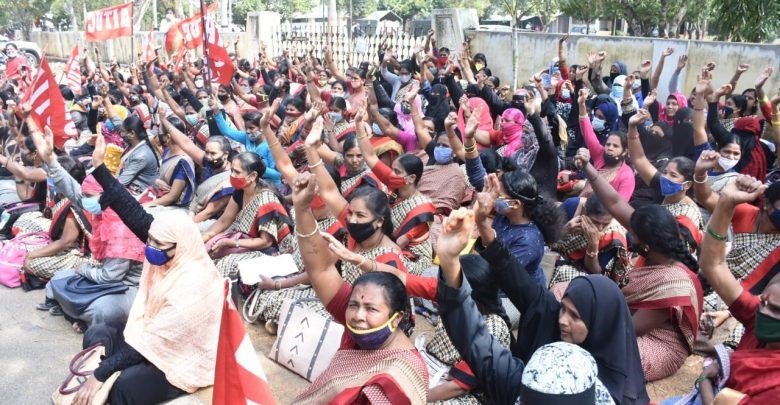
Women too in our country today are involved in the struggles that affect everyone in the society– the struggles against the privatization of public sector enterprises, and essential services such as health and education, against the attacks on our livelihood and rights through the four labour codes, the struggles of anganwadi workers, ASHA and Mid Day Meal workers, health workers, nurses, doctors and hospital workers, teachers and women in other services demanding security of livelihood, minimum wages and better conditions of work. They are fighting for the right to equal pay for equal work, for the right to an equal share of family property, for the right of kisan women to own the land they till, for rights of adivasi women over their forests, forest produce and water sources (jal-jangal-zameen). They are actively involved in the struggle against state organized communal violence and state terror and the attempts of the state to divide our people on the basis of religion, the struggle against caste oppression and discrimination, the struggle against sexual harassment and violence at the workplace, at home and in public spaces.
The farmers’ struggle paid particular attention to involving women in large numbers. Women driving tractors and leading a convoy of tractor trolleys and lakhs of protesting farmers, entering the nation’s capital to question the rulers and demand what they believe in, is not an everyday sight! And it is certainly not a memory that can be forgotten very easily. The stirring presence of women was witnessed at sites of farmers’ protest during the entire fight. Women farmers in the andolan were not merely present but braved the police barricading, cannon, and tear gas attacks from the front. The need for women to lead and release their initiative is what the farmers’ struggle acknowledged and demonstrated in practice. 18th January was chosen to be the day reserved to celebrate women’s contribution to the movement. Women were responsible for running the protest stage and for running the proceedings that entire day.
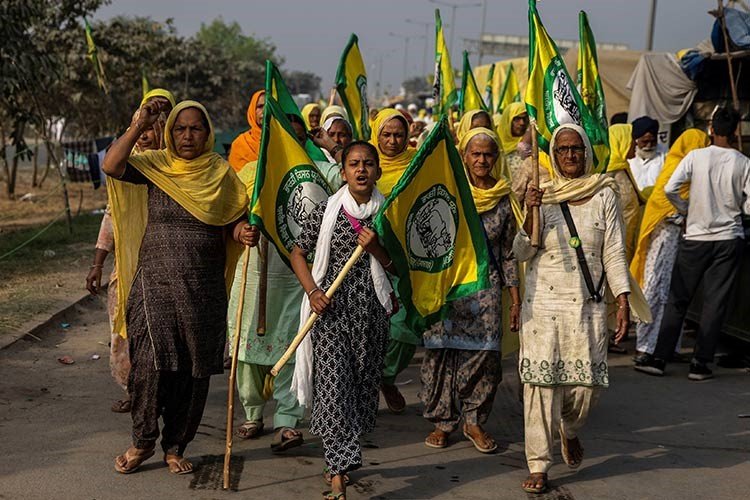
Women played a key role in the entire struggle and were the backbone of the year-long fight. While they took turns to turn up in large numbers at the protest sites, they also worked quietly at the backend to spread awareness and encourage people to join the fight. They handled responsibilities at farms during the day and organized “Jago” nights to go around the villages of Punjab and spread the message of struggle among people. Even at the Delhi borders, when locals were unhappy with the roadblocks due to the farmers’ protests, women took the initiative to go out and talk to locals about the farmers’ just demands and fight. This gained a lot of support from the people for the protest, which was much needed. Later it was also seen that people offered food and even their homes to be used whenever needed by protesting farmers. Running the kitchen was not the primary responsibility of women at any of the protest sites. Also when asked or interviewed, many women echoed the fact that they were extremely safe at the protest sites. What the farmers’ struggle demonstrated was not only the need to involve women in the struggle but also ways to enable it.
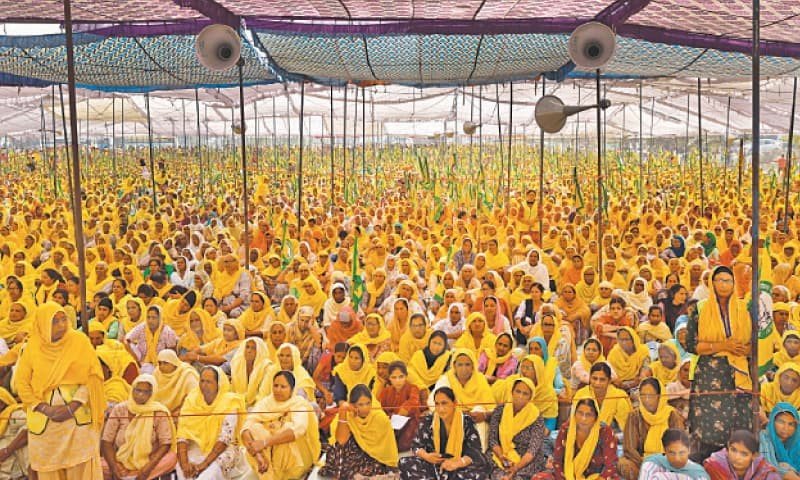
The deepening agrarian crisis leading to loss of employment in the farm sector is one of the consequences which hurts women the most. While families bear the burden of the crisis, farmers’ suicides affect women profoundly as they are left alone to bear the burden of it then. The participation of women in the farmers’ struggle was not a result of a call released in one night. Over the years unions in Punjab have paid serious attention to mobilizing women and raising questions about women’s rights to participate in struggles. Women have been an integral part of the protests on the questions of MSP, subsidies, compensation for farm suicides and failed crops for a long time now.
Workers’ unions across the country have always tried to gather the support of families for their just struggles. There are many examples of families of rail workers taking to the streets to support striking workers – the strike by loco drivers in Bilaspur against the deployment of running staff to remote places with no facilities to support their families, the massive dharna at the Parliament by engine drivers and guards protesting against privatization of railways, the nationwide strike against the privatization of railways organized by the Rail Coach Factory workers and the Central Labour Employees in Kapurthala, the strike to oppose privatization of rail production units, and many more. Even during the recent ongoing strike by the MSRTC (Maharashtra State Road Transport Corporation) workers, they were supported by women, children, and elderly people of the family. The women present on the protest sites went out to talk to the people on the roads about the issues and demands of MSRTC workers. Earlier in 2019, a day after the Brihanmumbai Electric Supply and Transport (BEST) undertaking issued eviction notices to its employees for going on strike, families of over 100 workers staged a protest outside the Wadala (in Mumbai) bus depot on Thursday. The pressure from the striking families of the workers was so tremendous that the BEST board was forced to take back its decision.
The intention to lock up women in kitchens or houses serves the rulers. The struggles of workers fighting against the rulers are thereby divided and it is ensured that half of the strength is kept away. Women who are a part of the workforce are doubly oppressed – as women and as workers. They are intentionally paid lesser than the men to suppress wages of all the sections of the workers and hence increased exploitation of all. Therefore, acknowledging the strength that women bring to a struggle and mobilizing them for the same is the responsibility of all sections of the workers.
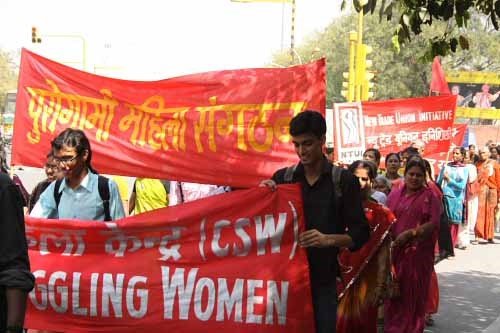
The fact is that today neither women nor men are a part of the decision-making process. Decisions are taken by the cabinet of the ruling party. In every election crores of rupees are poured in by the capitalists to fund the political party of their choice. The elected party then guarantees the implementation of the agenda set by the capitalists. It doesn’t matter which party comes to power. Neither does the gender of the elected representatives matter. They are all in actual fact, representatives of the capitalists who fund them and ensure their electoral victory in the existing political system. The only solution to this is the Nav Nirman of India, for replacing the current system with a new one that is geared towards the fulfillment of the growing needs of the people. An entirely new political system and process, in which we, the people, will be the decision-makers. We should have the right to select the candidates for election. We must be able to hold the elected representatives to account and to recall them if they violate our interests. We must have the right to make and amend laws in our interest.
The path to the emancipation of women lies in uniting with all sections of the workers and fighting towards the common goal of Nav Nirman! Participation of women in the workers’ movement is the need of the hour and the importance of it must be recognized by all sections of the workers.

Excellent article, movement against privatisation must need support of women’s, we have seen various movement like kisan andolan anti CAA protest and many more where women are in front, we have to learn from our history, half of the working class are women, they indeed strengthen our struggle.
PMS timely written this article political consciousness of working needs to be uplifted, working do understand power of collective, to defeat privatisation we must be united.